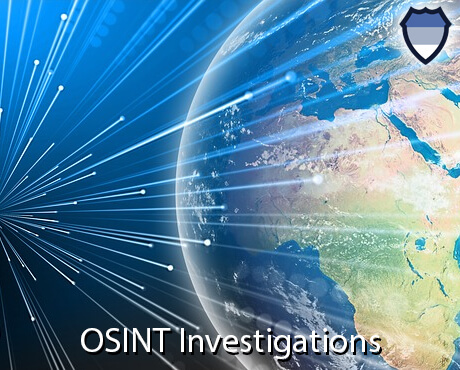How Private Investigators Use OSINT Background Checks
September 2, 2024 - Reading time: 7 minutes
Updated: October 8, 2024
In the digital age, information is more accessible than ever, and open-source intelligence (OSINT) has emerged as a powerful tool for private investigators. By leveraging publicly available data, investigators can conduct thorough background checks that provide invaluable insights into an individual's lifestyle, work life, relationships, and general activities. This article delves into how private investigators conduct OSINT background checks, the tools they use, and the various applications of this intelligence-gathering method.

What is 'OSINT'?
Open-source intelligence (OSINT) refers to the process of collecting and analysing information from publicly available sources. This can include anything from social media profiles, blogs, and news articles to public records and forums. In the realm of private investigation, OSINT is an invaluable resource, allowing investigators to build a comprehensive picture of a person’s life without the need for intrusive methods.
Gathering Information from Social Media
One of the primary sources of OSINT is social media. Platforms like Facebook, Instagram, Twitter, and LinkedIn provide a wealth of information that can be used to gauge a person's lifestyle and interests. By analysing a subject's social media activity, investigators can uncover details about their relationships, profession, hobbies, and even travel habits.
For instance, a private investigator may look at the posts a subject shares, the people they interact with, and the locations they frequent. This information can be particularly useful in cases of suspected infidelity, where understanding a partner's social interactions might reveal clandestine relationships or activities.
Advanced OSINT Tools
While basic OSINT techniques can yield significant information, private investigators often use more advanced tools to enhance their investigations. One such tool is facial recognition software. This technology allows investigators to match faces from images found online with known individuals, providing deeper insights into a person's online presence.
At Bangkok Private Investigators, we have successfully utilised facial recognition software in various investigations. This technology has proven effective in locating instances where a subject appears on dating websites or in adult material, such as webcam sites or pornography videos. Such findings can be particularly shocking for our clients, revealing hidden aspects of their partner's life that they may not have been aware of.
Locating Sensitive Information
Facial recognition tools in particular can also be used to identify individuals in more sensitive contexts. For example, it can help locate instances of revenge porn, where explicit images of an individual are shared without their consent. Investigators can search through various platforms to find these images, providing crucial evidence for clients seeking to take legal action.

Moreover, this technology can be employed to identify subjects in news media where they have been arrested for a crime. By cross-referencing images from news articles with available social media profiles, investigators can confirm the identity of individuals who may be involved in legal matters, thereby providing clients with accurate and timely information.
Applications of OSINT Background Checks
OSINT background checks are versatile and can be employed across various contexts. Here are some of the most common applications:
1. Detecting Infidelity: As mentioned earlier, OSINT can be an effective tool for those suspecting their partner of cheating. By analysing social media interactions and online behaviour, private investigators can uncover evidence of infidelity, helping clients make informed decisions about their relationships.
2. Pre-Employment Screening: Employers can utilise OSINT background checks as part of their hiring processes. By examining a candidate's online presence, employers can gain insights into their character, work ethic, and potential red flags that may not be apparent from a resume alone. This helps businesses make better hiring decisions and protect themselves from potential liabilities.
3. Personal Security: Individuals may seek OSINT background checks for personal security reasons. This could involve checking the background of a new acquaintance or ensuring that a potential roommate has no hidden issues. Understanding someone's history can provide peace of mind and safeguard against potential dangers.
4. Legal Investigations: Lawyers and legal professionals often rely on OSINT to gather evidence for cases. Whether it’s finding witnesses, uncovering hidden assets, or verifying alibis, the information gleaned from open sources can be instrumental in building a solid legal strategy.
5. Fraud Investigation: In cases of suspected fraud, OSINT can help uncover discrepancies in a subject's claims. By cross-referencing information from various sources, investigators can identify inconsistencies and provide evidence for legal proceedings.
Global Reach of Bangkok Private Investigators
Although Bangkok Private Investigators is based in Bangkok, our services extend globally. We understand that clients worldwide may require comprehensive background checks, and we are committed to providing competitive rates for our services. Our expertise in OSINT and advanced investigative techniques ensures that we deliver accurate and reliable information, no matter where our clients are located.
In summary
OSINT background checks represent a powerful tool for private investigators, enabling them to gather valuable insights from publicly available sources. By harnessing the power of social media, advanced tools like facial recognition software, and a wealth of information, private investigators can uncover the truth about individuals in various contexts.
At Bangkok Private Investigators, we pride ourselves on our ability to conduct thorough and discreet investigations, helping clients navigate the complexities of personal and professional relationships. Whether you suspect infidelity, require pre-employment screening, or need assistance in a legal matter, our team is here to help. Contact us today to learn more about our services and how we can assist you in uncovering the truth.
Related articles
Cutting-Edge Tools Revolutionising Private Investigation
August 30, 2024 - Reading time: 8 minutes
Updated: August 31, 2024
In the fast-paced world of private investigation, staying ahead of the curve is vital. With the advent of new technologies, private investigators are now equipped with an array of sophisticated tools that enhance their ability to gather evidence, analyse data, and ensure the utmost confidentiality and compliance. This article explores the latest advancements in technology that are transforming the private investigation landscape, ranging from software and mobile applications to high-tech camera gear.

Advanced Software Solutions
The role of software in private investigation cannot be overstated. Various applications have emerged that streamline case management, data analysis, and reporting.
1. Case Management Software: Platforms such as CaseGuard and MyCaseBuilder allow investigators to manage their cases efficiently. These tools help organise evidence, track tasks, and maintain communication with clients. The ability to access case files from anywhere enhances productivity and ensures that investigators can respond promptly to client needs.
2. Data Analysis Tools: Software like Palantir and i2 Analyst’s Notebook enables investigators to analyse large volumes of data swiftly. These platforms can process information from multiple sources, visualising connections between individuals, locations, and events. Such capabilities are particularly beneficial in complex cases involving fraud, missing persons, or criminal activity.
3. Surveillance and Monitoring Tools: With the rise of social media and online platforms, investigators increasingly rely on software that monitors digital activity. Tools like Hootsuite and Brandwatch allow private investigators to track social media posts, mentions, and trends, providing valuable insights into a subject's behaviour or associations.
Mobile Applications for On-the-Go Investigations
Mobile technology has transformed the way private investigators operate. A range of applications facilitates real-time data collection and communication.
1. GPS Tracking Apps: Applications such as Life360 and Glympse enable investigators to monitor the locations of individuals discreetly. These apps can provide real-time data on a subject’s movements, which is invaluable in cases involving surveillance or tracking.
2. Document Scanning and OCR Apps: Mobile applications like CamScanner and Adobe Scan allow investigators to quickly scan documents, convert them to PDFs, and extract text using Optical Character Recognition (OCR). This technology streamlines the process of gathering and storing evidence, making it easier to compile reports.
3. Secure Communication Apps: Maintaining client confidentiality is paramount. Secure messaging apps such as Signal and Wickr Me provide end-to-end encryption, ensuring that sensitive information remains protected from prying eyes.
High-Tech Camera Gear
Visual evidence plays a crucial role in private investigations. The latest advancements in camera technology have made it easier for investigators to capture high-quality images and videos discreetly.
1. High-Resolution Cameras: Modern digital cameras, such as the Sony Alpha series or Canon EOS R, offer exceptional image quality and low-light performance. These cameras enable investigators to capture clear images in various conditions, which can be crucial for evidence collection.
2. 360-Degree Cameras: Devices like the Ricoh Theta Z1 allow for immersive photography that can capture an entire scene in one shot. This technology is particularly useful in documenting accident scenes or locations of interest, providing a comprehensive view that traditional photographs cannot.
3. Camera Lenses: The choice of lens can significantly impact the quality of the captured image. Telephoto lenses, such as the Canon EF 70-200mm f/2.8L, allow for long-distance shooting without compromising clarity. This capability is essential for covert surveillance, enabling investigators to remain at a safe distance while still capturing necessary details.

Drones in Investigations
The use of drones has revolutionised aerial surveillance and data collection in private investigations. Drones equipped with high-definition cameras can cover large areas quickly, providing unique perspectives that ground-level investigation cannot achieve.
1. Aerial Photography: Drones like the DJI Mavic Air 2 or the Phantom 4 Pro allow investigators to capture stunning aerial images and videos. This capability is beneficial in various scenarios, including accident recreations, property surveys, or locating missing persons in remote areas.
2. Thermal Imaging: Some advanced drones are equipped with thermal imaging cameras. These devices can detect heat signatures, making them invaluable in search and rescue operations or monitoring environmental conditions.
Cyber Investigation Tools
As more activities shift online, the need for cyber investigation tools has grown. Private investigators now utilise software that helps uncover digital footprints and gather online evidence.
1. Digital Forensics Tools: Software like EnCase and FTK allows investigators to recover deleted files, analyse data from hard drives, and examine digital devices for evidence. These tools are essential in cases involving cybercrime, fraud, or intellectual property theft.
2. Social Media Analysis Tools: Platforms such as Netlytic can analyse social media interactions and identify connections between individuals. Understanding online behaviour is increasingly important in investigations, as many subjects may reveal information about themselves through their digital presence.
The Future of Private Investigation Technology
The landscape of private investigation technology continues to evolve at a rapid pace. Emerging technologies, such as artificial intelligence (AI) and machine learning, promise to further enhance the capabilities of private investigators. Predictive analytics can help investigators anticipate potential outcomes based on historical data, while AI-driven image analysis can streamline the process of examining visual evidence.

As technology advances, the role of private investigators will also shift. Staying abreast of these developments is crucial for professionals in the field, ensuring they can leverage the latest tools and techniques to serve their clients effectively.
The integration of cutting-edge technology into private investigation practices not only enhances efficiency but also elevates the quality of service provided to clients. By adopting these innovative solutions, private investigators can navigate complex cases with greater ease, ensuring that they remain at the forefront of the industry. Whether utilising advanced software, mobile applications, or high-tech camera equipment, the future of private investigation is undeniably bright.
Related articles
Find the Truth: How to Check Marriage Records in Thailand
August 27, 2024 - Reading time: 8 minutes
Updated: October 7, 2025
In a country as culturally rich and diverse as Thailand, understanding the nuances of marital practices is crucial, especially if you are in a relationship with a Thai national. Knowing your partner's marital status can save you from potential legal troubles and emotional distress. This article explains how marriage records work in Thailand, why checking them yourself is rarely effective, and how professional investigators can help you obtain the truth quickly and lawfully.

Understanding Marriage Records in Thailand
Marriage records in Thailand are maintained at the local amphur (district office) where the marriage is registered. This document serves as official proof of marriage and contains important details such as the names of the spouses, the date of registration, and any subsequent changes in marital status, such as divorces.
However, it is important to note that not all marriages in Thailand are legally registered. Some couples may hold a wedding ceremony without filing the official paperwork, meaning no formal record exists. Such unregistered marriages have no legal standing and can lead to serious complications if one partner later claims legal rights or assets based on an unregistered union.
Steps to Check Marriage Records in Thailand
If you need to check the marriage records of a Thai national, these are the basic steps you would follow:
1. Identify the relevant amphur office: Determine which district office holds the record. This is normally the office where the marriage was registered. If you do not know the location, you may need to ask your partner or conduct preliminary research.
2. Gather necessary information: Before visiting, collect the full names of both parties, the date of the marriage, and any other identifying details. The more information you can provide, the easier it will be for officials to locate the record.
3. Visit the amphur office: Visit the district office during working hours and ask about the process for obtaining a marriage certificate. Go early to avoid queues and ensure enough time to complete your request.
4. Request a copy of the record: If the record exists, you can request a certified copy by paying a small local fee. Costs vary by location.
5. Language considerations: Most staff only speak Thai, so it is helpful to bring someone who can translate for you.

Need to check if a Thai person is married?
Our investigators can verify marriage and divorce history from any province in Thailand as part of our background check service. Reports include full marital history, plus family, address, and employment history. Every enquiry is handled fully privately and confidentially. We also provide free quotes for all work.
Can you check by looking at an ID card or passport
No. ID cards and passports are not reliable indicators of current marital status. Titles like Miss and Mrs are not updated after marriage or divorce unless the subject specifically applies to change their title, and district offices will often not release marital data to private individuals. A formal records check is the only reliable way to confirm status.
Legal implications of marital status in Thailand
Understanding your partner's marital status is not just about peace of mind. It also carries legal consequences. According to Thai PBS World, if you are romantically involved with someone who is already married in Thailand, their spouse may have the right to sue you for damages. This makes verifying a partner’s marital status a crucial safeguard before deepening a relationship.

Additionally, if a couple has not legally registered their marriage, they do not enjoy the same legal protections and rights as a married couple. This can cause problems with property, inheritance, or child custody matters. Knowing where you stand legally can help prevent serious complications later.
The role of Bangkok Private Investigators
While checking marriage records may sound simple, in practice it is often slow and unreliable without local expertise. Some offices might refuse to cooperate with foreign requesters, and titles on ID cards cannot be trusted as proof of current marital status. That is where professional investigators can make all the difference.
How Bangkok Private Investigators can assist you
Bangkok Private Investigators is a leading agency specialising in background checks and due diligence across Thailand. Here is how our team can help you verify a person’s marital history with confidence:
1. Expert local knowledge: Our investigators are familiar with Thai legal procedures and local offices, allowing for efficient verification of marriage and divorce records.
2. Advanced background checks: Using official data and open source intelligence, we provide comprehensive reports that cover marriage, divorce, family, employment, and address history.
3. Full privacy and confidentiality: Every enquiry is handled discreetly and securely. We never disclose client details or enquiries to third parties.
4. Detailed reports: You receive a clear report summarising all verified records and findings, with supporting evidence where available.
5. Free, no obligation quotes: Before any work begins, we provide a transparent cost estimate so you can make an informed decision without pressure.
In summary
Checking marriage records in Thailand is an essential step for anyone in a serious relationship with a Thai national. Attempting to verify this information yourself often leads to incomplete or misleading results, and in some cases legal risk. Our investigators can handle the process professionally, confidentially, and with full accuracy.
If you would like to confirm a partner’s marital status or run a full background check, contact Bangkok Private Investigators today for a free, private quote. Protect yourself and get peace of mind through trusted, lawful investigation.
Related articles
Get Peace of Mind: Tenant Background Screening in Thailand
August 24, 2024 - Reading time: 7 minutes
Updated: October 8, 2024
In the vibrant rental market of Thailand, property owners face numerous challenges, not least of which is the critical task of selecting reliable tenants. With an influx of expatriates and locals seeking rental properties, the need for thorough tenant background screening in Thailand has never been more pressing. A comprehensive background check for tenants can serve as a vital tool for landlords, providing them with essential information that can mitigate risks associated with financial loss or property damage.

The Importance of Tenant Background Screening
When it comes to renting out a property, the stakes are high. A good tenant can ensure a steady income flow and maintain the property’s condition, while a problematic tenant can lead to costly evictions, unpaid rent, and extensive damage to the property. Thus, conducting background checks for tenants in Thailand is an essential step in the tenant selection process.
1. Financial Stability: One of the primary reasons for conducting tenant background checks is to assess the financial stability of potential tenants. This includes verifying their employment and income sources. By confirming that a tenant has a reliable income, landlords can significantly reduce the risk of missed rental payments. With Bangkok Investigators, we help you obtain relevant financial information to ensure that your prospective tenant can meet their rental obligations.
2. Rental History: Understanding a tenant’s rental history is crucial. Past behaviour can be a strong indicator of future actions. Background checks can reveal whether a potential tenant has a history of evictions or late payments. By identifying red flags in a tenant's rental history, landlords can make more informed decisions, ensuring they select tenants who are likely to respect the property and the rental agreement.
3. Criminal Background: Safety is a top concern for landlords and neighbours alike. Conducting background checks for tenants in Thailand can include a review of any criminal history. While everyone deserves a second chance, awareness of any serious criminal background can help landlords assess potential risks and make informed choices about their tenants. This aspect of screening promotes a safer living environment for all residents.
4. Character References: Tenant background screening often includes gathering character references. Speaking to previous landlords or employers can provide valuable insights into a tenant's reliability and character. A good reference can be a strong indicator of a tenant's suitability, while a negative reference may suggest potential issues that could arise during the tenancy.
5. Civil Litigation Check: If your potential tenant is currently subject to action in the civil courts (i.e. if they are currently being sued), then this might indicate to potential issues with their financial stability and will act as a red flag in most cases.

Mitigating Financial Risks and Property Damage
Conducting a thorough tenant background screening in Thailand is not just about gathering information; it is about making strategic decisions that ultimately save landlords from financial distress and property damage.
1. Reducing Eviction Rates: The cost of evicting a tenant is significant, both financially and emotionally. Background checks can help prevent the selection of tenants who may ultimately lead to eviction proceedings. By carefully vetting applicants, landlords can reduce the likelihood of facing this daunting process, thus saving time and money.
2. Preserving Property Value: A trusted tenant will treat the property with respect, reducing the risk of damage. Background checks for tenants in Thailand can help ensure that landlords choose individuals who are likely to maintain the property in good condition. This preservation is vital for maintaining the property's value over time and avoiding costly repairs.
3. Peace of Mind: Knowing that you've conducted a thorough screening process can provide landlords with peace of mind. By choosing to work with a reputable agency like Bangkok Investigators, landlords can be confident that they are making informed decisions based on comprehensive data. This assurance allows landlords to focus on other aspects of property management without the constant worry of potential tenant issues.
How Bangkok Private Investigators Can Help
At Bangkok Investigators, we understand the importance of diligent tenant background screening. As a leading private detective agency in Thailand, we offer tailored background checks for all manner of reasons, including tenant screening. Our experienced team conducts thorough investigations to gather the necessary information, ensuring that you have the data you need to make informed decisions.
We pride ourselves on our professionalism and commitment to client satisfaction. We offer free, no-pressure quotes for all our services, allowing you to explore your options without obligation. Whether you are a seasoned landlord or new to the rental market, we are here to assist you every step of the way.
In closing
In the competitive rental landscape of Thailand, tenant background screening is an essential practice for landlords aiming to protect their investments. By conducting thorough background checks for tenants in Thailand, property owners can significantly mitigate the risks of financial loss and property damage. The benefits of a well-executed screening process are clear: improved tenant quality, reduced eviction rates, and ultimately, a more secure rental experience.
If you are a landlord seeking peace of mind and the assurance that your tenants will uphold their responsibilities, consider reaching out to Bangkok Investigators for a comprehensive tenant background screening. We are here to help you navigate the complexities of tenant selection and ensure that your property is in safe hands. Contact us today for a quote and take the first step towards securing your investment!
Related articles
Search
Bangkok Investigators

Discover more about Bangkok Private Investigators on our homepage or by visiting our About Us page.